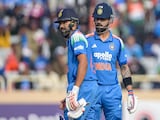The Central government - which will begin the second phase of vaccination in mid-March - will give priority to people aged sixty and above and those who have comorbidities for longer duration, Dr Suneela Garg, an advisor to Indian Council For Medical Research (ICMR), told NDTV. She said there will be segregation based on several criteria in the target group of 27 crore people and each sub-group will have separate inoculation timelines. She also said that the private sector will play a major in the drive.
"For the general population, we will have to prioritise - we will first go for those aged 60 years and above, and then those aged 50 years and above. Along with that we will also vaccinate those suffering from comorbidities. We will also segregate them on the basis of the duration of non-communicable diseases - those who have chronic diseases will be given priority," she said.
Dr Garg, who is also on the Lancet Commission's Covid-19 India Taskforce, said those suffering from comorbidities like "diabetes, hypertension, cardiovascular diseases, stroke, cancer, chronic respiratory diseases" will also be prioritised above people with other diseases.
Asked if each sub-group will have separate deadlines for vaccination, she said, "These timelines are essential because unless we have timelines in place, the general human behaviour is that we will go on the last day. Like it happened with the healthcare workers, the frontline workers".
Explaining how people with comorbidities will be segregated for vaccinations, she said: "If I am co-morbid and I want get vaccinated, the certificate will mention how long I have been diabetic or hypertensive or whether I am controlled hypertensive or uncontrolled hypertensive. Between two hypertensive people, the one who has been hypertensive for a longer duration will get priority".
Who will pay for the vaccines?
Dr Garg said discussions on the vexed subject are on. "It is under consideration. Some states have said they will be providing vaccines free of cost. Health is a state subject. But if the private sector is also involved, some payment will have to be made. But another thing we should keep in mind is that a large number of people are below the poverty line – the government is also taking that into consideration."
She said segregation of the target group will not hamper the progress of the drive as a large number of vaccination points will be set up.
"Private sector will have a very major role to play if we have to reach the last mile – that means around 29,000 plus cold chain points. We will be creating roughly double the vaccination points…there would 40-50 percent private sector vaccination points," she added.














